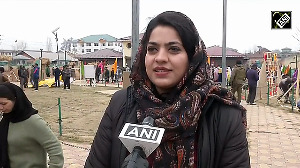As several Pakistanis huddled against the cold, some looted food stores out of desperation on Monday because aid had still not reached remote areas of Kashmir, where a devastating earthquake flattened villages, cut off power and water, and killed tens of thousands.
Officials predict the death toll, now estimated at between 20,000 and 30,000, will climb because of exposure and disease. With winter just six weeks away, the United Nations has said 2.5 million people near the Pakistan-India border need shelter.
More than two days after the magnitude-7.6 quake, survivors were pulled from under piles of concrete, steel and wood in the mountainous swath touching Pakistan, India and Afghanistan.
A man was rescued from a pancaked two-story house in Muzaffarabad, two girls were plucked from a collapsed school in Balakot, and a woman and child were pulled from an apartment building in Islamabad. Injured people were airlifted from remote areas and Pakistan's army distributed rice to starving survivors.
President General Pervez Musharraf said his government was doing its best to respond to the crisis. He had appealed for international help, particularly cargo helicopters to reach remote areas cut off by landslides.
"We are doing whatever is humanly possible," Musharraf said. "There should not be any blame game. We are trying to reach all those areas where people need our help."
Eight U.S. helicopters - five Chinook transport choppers and three Black Hawks for heavy lifting - were diverted from the war in neighbouring Afghanistan. They carried supplies, tarpaulins and equipment, including high-tech cameras for finding buried survivors.
Three military cargo planes with blankets, tents, meals and water also arrived. "Pakistan is one of our closest allies in the war on terror and we want to help them in this time of crisis," Sargeant Marina Evans, a US military spokeswoman, said in Kabul, Afghanistan.
Washington pledged up to $50 million in aid, US Ambassador Ryan Crocker said. "We have, underway, the beginning of a very major relief effort," he said.
Pakistan also said it would accept aid from its longtime rival India, which promised tents, food and medicine. However, Islamabad declined an offer of helicopters and has ruled out a joint rescue operation along the disputed frontier.
The nations fought two wars over Kashmir, which both claim in its entirety. A 15-year insurgency opposed to New Delhi's rule has killed more than 66,000 people, mostly civilians. India reported 1,005 deaths in its portion of the province.
Planeloads of aid arrived from Britain, Japan, Turkey and the United Arab Emirates. Russia, China and Germany also offered assistance.
With winter approaching, thousands of homeless Pakistanis huddled in tents and in the open. Many lit fires using wood from collapsed houses.
The capital of Pakistan-controlled Kashmir, Muzaffarabad, was devastated, with at least 11,000 people reported dead. Masood-ur Rehman, an assistant city commissioner, said 90 percent of the city, and all its government and educational institutions, were destroyed. Relief efforts were hampered by landslides.
"Bodies are scattered in the city," he said. "Ninety percent of victims are still buried under the debris. We are helpless. The city is out of order."
In one neighborhood, shopkeepers scuffled with looters scavenging crushed stores for cooking oil, rice, biscuits and flour. The storeowners and looters fought with large sticks and rocks and some looters suffered head wounds. No police were seen.
"We haven't eaten anything for two or three days. The shops are closed and we haven't got anything from the government," said a 20-year-old man who refused to identify himself as he ferreted away stolen goods. "We are desperate and hungry."
Residents said looters also targeted deserted homes and gas stations. Survivors lacked food and water amid little sign of any official relief operation in the devastated city of 600,000. Soldiers on an army truck threw bags of rice to a throng of people with outstretched arms.
About 2,000 residents huddled around camp fires on a soccer field at the city's university campus, where hundreds were feared buried in collapsed classrooms and dormitories. Soldiers burrowed into the concrete with shovels and iron bars.
"I don't think anybody is alive in this pile of rubble," said Uzair Khan, a rescue worker. "But we have not lost hope."
Mohammed Ullah Khan, 50, said a few biscuits handed out by relief workers were his only food for three days. His three-story home had collapsed, but his family of 10 survived because they were on the top floor.
"My children are now on a hillside, under the open sky, with nothing to eat," he said, while camping on the soccer field.
A doctor, Iqbal Khan, said survivors were at risk for diarrhoea and pneumonia if drinking water and other supplies did not arrive quickly.
An eight-member British team using a body-detecting dog, drills, chain saws and crowbars pulled a 20-year-old tailor from underneath a two-story building 54 hours after it collapsed.
The man, who identified himself as Tariq, was trapped under concrete slabs and wood beams, dead bodies flanking him, in what used to be a two-story building.
"I haven't eaten in three days, but I'm not hungry," said the dusty, wide-eyed man, who begged for water. He had suffered a leg injury and was carted away on a door.
In Balakot, a badly-hit town in North West Frontier Province, townspeople hearing cries for help broke through a heap of concrete that was once a school and rescued two girls. A crowd pulled to safety the first girl, wearing a green shirt and with a gold bracelet on her arm.
The second girl, a toddler, had scratches on her face. Several men brushed dust from her clothing and gave her water.
"There are many more alive inside, but we can't take them all out because we don't have government efforts here," said Sadan Khattak, a student from Peshawar who was helping rescue efforts.
Mohammed Farhad, 9, was pulled from the rubble Sunday night, but his brother died.
"We were having reading lessons when suddenly there was a big noise and the roof collapsed on us," he said, bursting into tears.
At another site, an 18-month-old boy was pulled alive from the rubble and given to his sobbing father. The boy was given a box of milk to drink.
Bodies were laid out on a basketball court, while workers with pickaxes dug up a playground for use as a mass grave.
In the Pakistani capital, rescuers continued digging through the ruins of a 10-story apartment building after pulling the woman and child to safety. Asim Shafik, who was assisting in rescue efforts, said voices were heard in the rubble, where at least two dozen people died.
Estimates of Pakistan's death toll varied. Information Minister Sheikh Rashid Ahmed said it exceeded 20,000. The top elected official in Kashmir, Sardar Sikandar Hayat, said it was more than 25,000, while the province's communications minister, Tariq Mahmood, said it was more than 30,000.






 © 2025
© 2025